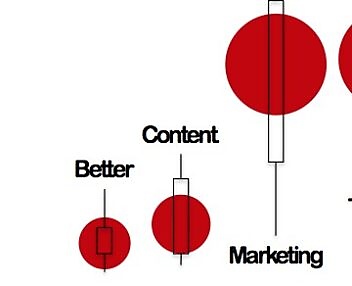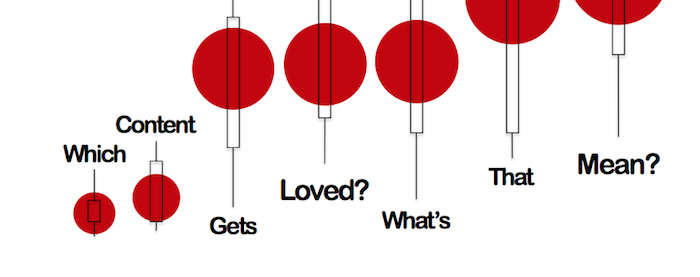Your boss: “So will this [insert content marketing tactic here] conquer the world, get hundreds of thousands of shares and rival Gangnam Style?”
You: [string of excuses, qualifications, wild guesses and tenuous supporting arguments]
Your boss (thinking): “He has no idea, does he?”
Admit it. When producing content, we just don’t know what’s going to take off.
Or even what’s going to do better than the last thing.
Fortunately, we can assess what has already done well, and progress from there.
____________________________________________
Before you think “not another damn data post”, stop right there! I’m going to show you what posts did well, and what posts didn’t do as well on top marketing sites (Econsultancy.com, Hubspot’s blog and the SEOMoz blog). And give you some idea why. That’s stuff you can use. Back to our story…(don’t worry, I’ll get to the findings real quick)
____________________________________________
I’ve argued before for using social share data as the content marketing guide rail (conversions and sales are more important obviously, but they’re strategic measures that won’t impact tactics like “what do I write about tomorrow? Or next week? Or which format – infographic, micrographic, list post, resource, controversial opinion piece, etc.?”).
Social share data shows how the content rubber hit the real world road. Sometimes people share content that they think is terrible, but – generally – a share is proxy for “I appreciated this, and I think you might too”, which is a pretty good baseline measure for what you’re doing in content marketing. (For what it’s worth, MarketingProfs’ Ann Handley and Hubspot’s Dan Zarrella seem to concur.)
Another advantage of social share data is that it’s public, meaning you can examine other sites’ data. Competitors’ data. Media sites’ data. Influencers’ data. Fantazballs!
So that’s just what I did:
Welcome to the big marketing blog popularity study!
I pulled social share data (specifically, the number of tweets – direct, not RTs) for three big marketing blogs/sites – econsultancy.com, the Hubspot blog and the SEOMoz blog. I created a baseline from forty randomly selected recent posts, and then pulled data along a series of dimensions that I assumed may impact popularity, such as:
- Author
- Topic
- Keywords
- Title characteristics
- Comments
- Etc. etc. etc.
What does this tell you? Explicitly it tells you what kinds of content got the most shares on those sites, which implicitly tells you what kind of content might get the most shares on your site. But, implicitly, it tells you some things about how people relate to content sites, how they relate to content, how they relate to writers, to topics and to ideas.
[Be advised that findings are not drawn on thousands or hundreds of thousands of data points, but rather on dozens. Outliers can skew results – something I’ll try to make explicit when I see it.]
If you found the study useful or interesting, please do share. For the next study 🙂

Enjoyed this article?
Take part in the discussion









Comments
Luella Ben Aziza May 23rd, 2013
Brilliant stuff. Love it that hashtags didn’t make it in at all! I dig the transparency. And it’s great to see Chris Lake, Dr. Pete outdoing their bosses.
Jay Acunzo May 23rd, 2013
Nice analysis Ryan! If you ever want to chat about the stuff you can’t necessarily learn from data (like why we’ve seen an uptick in traffic and tweets lately – which was a positive outcome of a concerted approach here at HubSpot), let me know or tweet me @jay_zo 🙂 I am a big fan of your slideshares
Ashley Friedlein May 23rd, 2013
Sadly, since publication of this data, Chris Lake has left Econsultancy to spend more time with his family. Key lesson here: don’t out-slug your boss.
Only joking… well done Chris 😉
Ashley
(p.s. as Jay says there are things you don’t know about that further skew your analysis but let’s not over-complicate a worthwhile piece of analysis and good piece of content marketing about content marketing. Not least because it would only make my personal stats even less good…)
Ryan Skinner May 24th, 2013
Thanks, Luella, Jay & Ashley.
Luella: That lieutenants with hustle can outperform their bosses is a redeeming feature of the modern content economy.
Jay: Will @ you forthwith to hear what you can add. Enlighten me!
Ashley: Are you suggesting that some of your posts get an unnatural twitter uplift? In any event, the data almost always bears itself out eventually (provided the data set’s big enough and the timeframe long enough). I’ll have to do a sequel every year with 10x data 😉